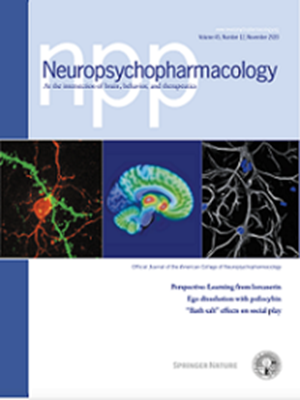Extended amygdala corticotropin-releasing hormone neurons regulate sexually dimorphic changes in pair bond formation following social defeat in prairie voles (Microtus ochrogaster)
IF 6.6
1区 医学
Q1 NEUROSCIENCES
引用次数: 0
Abstract
The neurobiological mechanisms underlying the connection between anxiety brought on by social stressors and the negative impact on relationship formation have remained elusive. In order to address this question, we used the social defeat model in the socially monogamous prairie vole to investigate the impact of this stress on pair bond formation. Social defeat experience inhibited partner preference formation in males but promoted preference in females. Furthermore, pair bonding increased corticotropin-releasing hormone (CRH) expression in the bed nucleus of the stria terminalis (BNST) in male prairie voles, while defeat experience increased BNST CRH expression in females. Chemogenetic excitation of BNST CRH neurons during a short cohabitation with a new partner promoted a partner preference in stress-naïve prairie voles. Interestingly, chemogenetic inhibition of BNST CRH neurons during cohabitation with a new partner blocked partner preference in stress-naïve males but promoted preference in defeated males. Inhibition of BNST CRH neurons also blocked partner preference in stress-naïve females but did not alter preference behavior in defeated females. This study revealed sexual dimorphism in not only the impact of social defeat on pair bond formation, but also in the role BNST CRHergic neurons play in regulating changes in pair bonding following social conflict.

扩展的杏仁核促肾上腺皮质激素释放激素神经元调节草原田鼠(Microtus ochrogaster)社会性失败后成对结合形成的两性二态变化。
社会压力源带来的焦虑与人际关系形成的负面影响之间联系的神经生物学机制仍然难以捉摸。为了解决这个问题,我们在社会一夫一妻制草原田鼠中使用社会失败模型来研究这种压力对配对形成的影响。社会失败经验抑制了男性伴侣偏好的形成,但促进了女性伴侣偏好的形成。此外,配对结合增加了雄性草原田鼠终纹床核(BNST)促肾上腺皮质激素释放激素(CRH)的表达,而失败经历增加了雌性草原田鼠BNST CRH的表达。stress-naïve草原田鼠与新伴侣短暂同居时BNST CRH神经元的化学发生兴奋促进了伴侣偏好。有趣的是,与新伴侣同居时BNST CRH神经元的化学发生抑制抑制了stress-naïve雄性的伴侣偏好,但促进了失败雄性的伴侣偏好。抑制BNST CRH神经元也阻断了stress-naïve雌性的伴侣偏好,但没有改变失败雌性的偏好行为。本研究不仅揭示了两性二态性在社会失败对配对结合形成的影响,而且还揭示了BNST - CRHergic神经元在社会冲突后对配对结合变化的调节作用。
本文章由计算机程序翻译,如有差异,请以英文原文为准。
求助全文
约1分钟内获得全文
求助全文
来源期刊

Neuropsychopharmacology
医学-精神病学
CiteScore
15.00
自引率
2.60%
发文量
240
审稿时长
2 months
期刊介绍:
Neuropsychopharmacology is a reputable international scientific journal that serves as the official publication of the American College of Neuropsychopharmacology (ACNP). The journal's primary focus is on research that enhances our knowledge of the brain and behavior, with a particular emphasis on the molecular, cellular, physiological, and psychological aspects of substances that affect the central nervous system (CNS). It also aims to identify new molecular targets for the development of future drugs.
The journal prioritizes original research reports, but it also welcomes mini-reviews and perspectives, which are often solicited by the editorial office. These types of articles provide valuable insights and syntheses of current research trends and future directions in the field of neuroscience and pharmacology.
 求助内容:
求助内容: 应助结果提醒方式:
应助结果提醒方式:


